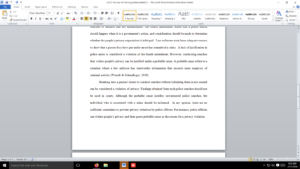Law enforcement officers
Initial Post: Post one major response to each discussion board by Wednesday 11:59 pm CT. Initial post must be at least 150 words.
Use APA formatting to reference sources. If there are questions about how to format according to APA you should access: OWL Purdue (Links to an external site.).
See Assignments and Grading for the guidelines for Unit Discussions.
Commenting to Dr. White’s responses are not included in the participation standards – only those to colleagues and do not restate the question as everyone is responding to the same one.
Key Points
Probable Cause, search and seizure, arrest warrants, Fourth Amendment, citizen vs. government agent, justification, components of probable cause.
Objective: Discuss when Fourth Amendment provisions apply to activities undertaken by law enforcement officers, and describe existing rules governing the conduct of searches and seizures.
Police officers experience different types and levels of training which is to prepare them for being able to make decisions concerning predictable situations. One such setting is annual updates on changes in the law. The assumption is, however, that they knew the original law prior to the change. The predictable sets of facts if repeated are easy to deal with. The issue then becomes what to do if the factual scenario is not exactly that for which they were trained.
The legal constraints on police deal with what they should not do in a given set of facts. For example, they must know when, and for what reason a person should be taken into custody or arrested for an offense. The constraints are the basis for most police academy legal training. There are certain official behaviors that must be adhered to in moment of stress. Police constraints protect the liberty of citizens which is the most important freedom. Training is that means of ensuring that police know what they can or cannot do. Is there a professional obligation to be conversant all aspects of the law that they are obligated to enforce?
The two websites for this discussion.
https://www.youtube.com/watch?v=JaWgg9rUNz0
https://www.youtube.com/watch?v=ylJK4LKAINs
This Unit’s Question (do not restate the question because everyone is responding to the same one)
Describe the relationship of probable cause to a citizen’s right to privacy. What would be an example of a violation of privacy and are there sufficient constraints on police power to prevent privacy violations?
Answer preview
The fourth amendment states that a police search should happen when it is a government’s action, and consideration should be made to determine whether the people’s privacy expectation is infringed. Law enforcers must have adequate reasons to show that a person they have put under arrest has committed a crime. A lack of justification in police arrest is considered a violation of the fourth amendment. However, conducting searches that violate people’s privacy can be justified under a probable cause. A probable cause refers to a situation where a law enforcer has trustworthy information that exceeds mere suspicion of criminal activity (Worrall & Schmalleger, 2018).
[331 Words]
Law enforcement officers


